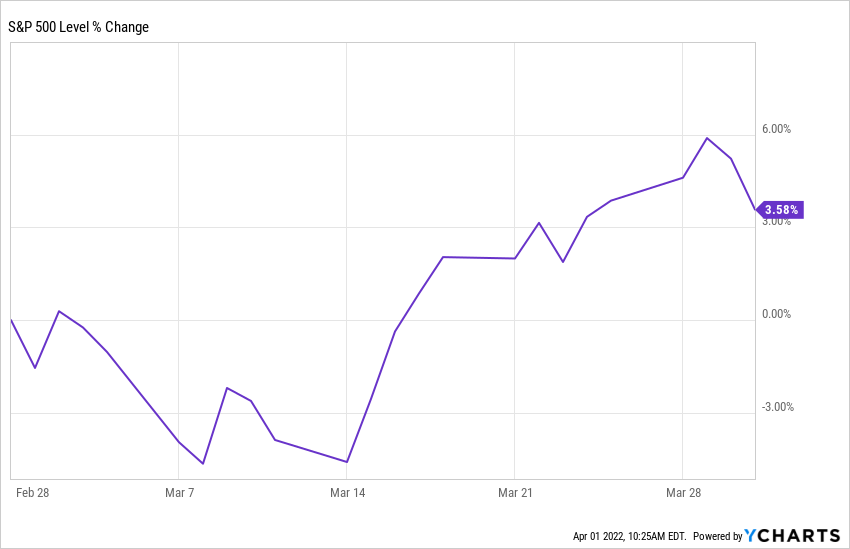Monthly Market Update
Submitted by TLWM Financial on April 1st, 2022
March was another volatile month for stocks as the S&P 500 pulled back at the beginning of the month before rallying nicely to finish the month up 3.58%.
We believe that this back-and-forth volatility has been driven by three main factors:
- Russia-Ukraine conflict: Russia’s invasion of Ukraine has increased geo-political risk and uncertainty. The ongoing impact to economic growth and inflation is something we’ll be monitoring. Further escalation or de-escalation of the conflict will likely continue to move markets.
- The Fed: The Fed raised rates in March. This was a much anticipated and widely expected decision. Investors analyzed every word of the Fed statement for signs of future Fed policy as the 10 Year US Treasury yield jumped to approximately 2.33%. Ongoing policy adjustments will be important as the Fed tries to fight inflation without slamming the brakes on economic growth.
- Inflation: We all continue to feel the impact of inflation in our day to day lives and in the financial markets. Inflation and economic data over the next few months should give us a sense of how inflation’s impact moving forward.
While we feel that it’s going to be important for us to watch how each of these factors could impact economic growth, we currently believe that the chance of a recession in the near term remains low. As such, we continue to be fully invested in the growth side of our portfolios.
In addition to the items listed above we’ll be watching economic data, corporate earnings, and our economic dashboard for signs that the odds of a recession are increasing, and will be ready to make adjustments if needed.
Sincerely,
Your Team at TLWM
* Investment advice offered through TLWM, LLC., a registered investment advisor.
* The Standard & Poor's 500 (S&P 500) is an unmanaged group of securities considered to be representative of the stock market in general. You cannot invest directly in this index.
* The Standard & Poor’s 500 (S&P 500) is an unmanaged index. Unmanaged index returns do not reflect fees, expenses, or sales charges. Index performance is not indicative of the performance of any investment.
* The 10-year Treasury Note represents debt owed by the United States Treasury to the public. Since the U.S. Government is seen as a risk-free borrower, investors use the 10-year Treasury Note as a benchmark for the long-term bond market.
* Government bonds and Treasury Bills are guaranteed by the U.S. government as to the timely payment of principal and interest and, if held to maturity, offer a fixed rate of return and fixed principal value. However, the value of fund shares is not guaranteed and will fluctuate.
* Corporate bonds are considered higher risk than government bonds but normally offer a higher yield and are subject to market, interest rate and credit risk as well as additional risks based on the quality of issuer coupon rate, price, yield, maturity, and redemption features.
*Credit risk can be a factor in situations where an investment’s performance relies on a borrower’s repayment of borrowed funds. With credit risk, an investor can experience a loss or unfavorable performance if a borrower does not repay the borrowed funds as expected or required. Investment holdings that involve forms of indebtedness (i.e. borrowed funds) are subject to credit risk.
* Typically, the values of fixed-income securities change inversely with prevailing interest rates. Therefore, a fundamental risk of fixed-income securities is interest rate risk, which is the risk that their value will generally decline as prevailing interest rates rise, which may cause your account value to likewise decrease, and vice versa. How specific fixed income securities may react to changes in interest rates will depend on the specific characteristics of each security. Fixed-income securities are also subject to credit risk, prepayment risk, valuation risk, and liquidity risk. Credit risk is the chance that a bond issuer will fail to pay interest and principal in a timely manner, or that negative perceptions of the issuer’s ability to make such payments will cause the price of a bond to decline.
* Opinions expressed are subject to change without notice and are not intended as investment advice or to predict future performance.
* Economic forecasts set forth may not develop as predicted and there can be no guarantee that strategies promoted will be successful.
* Past performance does not guarantee future results. Investing involves risk, including loss of principal.
* You cannot invest directly in an index.
* Consult your financial professional before making any investment decision.
* Stock investing involves risk including loss of principal.
* This document is solely for informational purposes. Advisory services are only offered to clients or prospective clients where Texas Legacy Wealth Management and its representatives are properly licensed or exempt from licensure.
* No strategy ensures a profit or protects against a loss.

